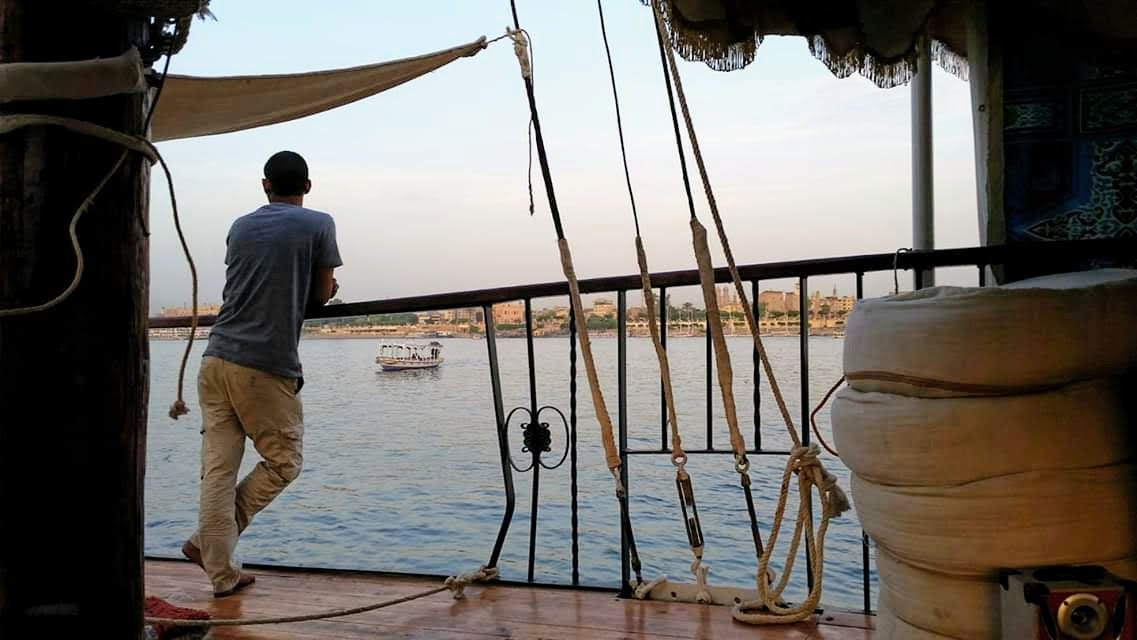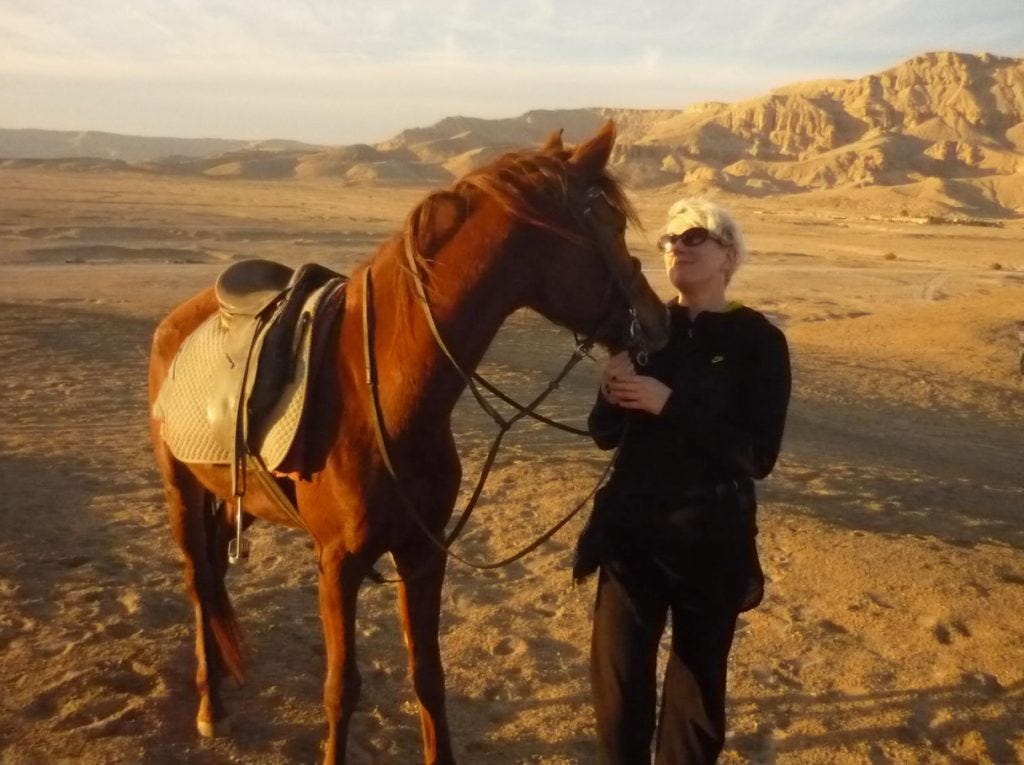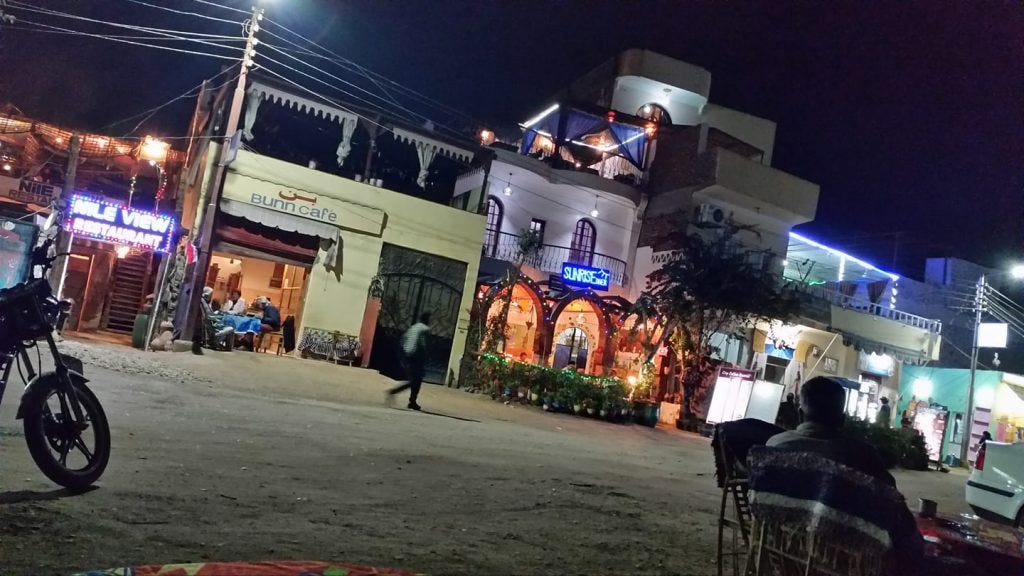Tales of Eclipse: The Lost (Foreign) Women of Luxor
During Covid all the tourists left, leaving behind the women who had married local men and couldn't get out. Women who had believed the fairytales and fallen for the lies.
One-time or recurring donations can be made at Ko-Fi.
You can listen to me read this article here:
Today, I came across this video of Senior Saudi Islamic Scholar Sheikh Al-Fawzan justifying the capture of the wives of “infidels” in war:
The Muslim capture of women in the (630) Battle of Awtas. They took from the infidel’s money and women as booty…. It was customary for the owners of the women captured at war to take them as concubines. They have the right to take them as concubines and have sex with them by virtue of possessing them. The possession of a captured woman outweighs her marriage contract. It allows the master to have sex with the woman he owns. This is called concubinage…. When a woman is taken captive, her marriage contract with her infidel husband is annulled. If she is taken captive, she becomes the property of the Muslims.
First of all, this made me think of the women who were raped and kidnapped on October 7th and what must be happening to the ones who are still hostages of Hamas. There are no words adequate to describe how I feel about that evil!
Then, it made me think about the experiences of my friend, Eva, in Luxor during the Covid pandemic. Back in May 2022, I wrote about it for Egyptian Streets. In light of world events, I think it’s time to publish it here.
But first, a little introduction.
I am well aware that what I write about happens all over the world. More so with Western men going to poorer countries and preying on the local women. I saw it in Costa Rica and other places. It’s the reverse in Luxor, it’s the local men who prey on the foreign women. What makes Luxor so fascinating to me, as a writer (and I was there writing), is that it’s microcosm of how one group in power so easily manipulates those they consider to be beneath them and how those who are manipulated purposely delude themselves to make their situation more palatable. We can all learn a lesson from this—especially as we see ourselves constantly manipulated by the media and our government.
Another fascinating aside to do with the history of Luxor is that the inhabitants come from five families tracing their proud history as grave robbers back hundreds of years.


So, when they take advantage of a foreign woman, everyone is involved, from the real estate agent to the police officers, to the lawyer who promises to help the woman. They are all related and they all protect one another. It is not an exaggeration to say you cannot trust anyone in Luxor. At the same time, it is a wonderous and seductive place. I wrote about this dynamic in Neom's THE LINE: City of the Dead, comparing Saudi Arabia’s new city The Line (part of Neom) with ancient Luxor.
Another interesting aside about this article is that I could not, for the life of me, get it published by any liberal news outlet in the United States (and all the main news outlets are liberal). Ironically, it was a liberal Egyptian paper, Egyptian Streets, that published it. They are very aware of this problem and weren’t afraid to address it. ES has bravely published articles exposing rape in Egypt and other topics that aren’t usually talked about.
In the West, my article went against the narrative of how Islamic countries are perceived. I don’t talk about this aspect in my article, but I will when I publish my own story of what I experienced while living in Luxor. Up until this Israel/Gaza war, no one in the West wanted to admit that the horrors happening in Muslim countries have anything to do with religion. It’s just “culture” and we shouldn’t try to change anyone’s culture. But the fact is, it has everything to do with religion. Now, at least it is being talked about. Countries that live under Sharia Law are still living in the past. I found this out to a frightening extent while living in Luxor.
Without further ado, here is The Lost (Foreign) Women of Luxor.
“Prostitute!”
“Bitch!”
“Give me my money, bitch!”
“You come to the police station NOW!”
You never leave!”
“Fuck you and all prostitutes who come to our country!”
These were the screams I heard as I approached Gezira Gardens, the hotel where my friend Eva was staying. I could see her silhouette in the back of the taxi, and I could hear her shrill cries of fear mixed with the screams.
Eva and I had been stranded in Luxor, Egypt, during the COVID-19 pandemic. As luck would have it, we had finally found flights out on the same day. Now, it looked likely that Eva wouldn’t be getting on that plane.
The taxi was surrounded by an angry mob of men. One man, the lawyer who had promised to help Eva settle a dispute with her Egyptian ex-husband, was screaming obscenities through the window nearest to where she sat. On the other side, the man who had introduced Eva to the lawyer, had climbed into the backseat and was also screaming obscenities while trying to pull her out of the car. Meanwhile, the horde of men were adding to the melee by banging on the car and screaming, too. Amongst them, I could see Eva’s neighbor, Ahmed, to whom she had sold her villa.
The selling of her villa and expecting to actually be paid for it, was how the problems had all started. There were many men who coveted Eva’s villa – a lovely one, in Ramla, a desirable area – including her ex-husband who tried to say it belonged to him, and Ahmed who had been eyeing it for years and had come to believe it was his by right.
A policeman, large and official in his white uniform, stood next to the car. He was doing nothing. The taxi driver, Mohamad, was sitting in the driver’s seat, unable to move the car forward due to the crowd. Mohamad was someone who had helped me during a few other tricky situations as he had proved reliable. He told me later that when he arrived, he had been threatened. If he took Eva to the airport, the angry men knew where he lived, and they would make him pay. To his credit, he had not abandoned her but had waited for my arrival.
As I got closer to the angry mob, I squared my shoulders and put on my best Moudira (executive) demeanor.
“What is going on here?” I demanded, loud and imperious.
The noise stopped. Everyone recognized me as that trouble-making American woman who had stood up for Eva during this process of selling her villa when other foreign women had abandoned her. It was also well-known that I had stood up, over the past few years, against other scams of local men.
Upon seeing me, the policeman’s eyes grew wide with worry. Immediately, he yanked on the man who was trying to force Eva out of the car, hissing, “Stop, stop!”
The man extricated himself, and faced me, flushed and defiant.
“She cannot go!” he yelled.
At six feet tall, I towered over most of those men.
I’ve always despised bullies. In my younger years, I was married to a physically abusive man. Once I’d freed myself from the marriage, I’d started training in martial arts, a life-long pursuit for me. Achieving a black belt in Tang Soo Do and a brown belt in Eskrima weapons, I’ve been a boxing coach for over ten years with a passion for empowering women and girls to overcome abuse.
I looked at the little man in front of me and swept my eyes across the crowd. Disregarding how hard my heart was beating, I said in a voice of authority, “This is unacceptable! Get away from the car. We are leaving now!”
Miraculously, they backed away, the policeman making a big show of helping to push the crowd back.
I nodded at him and said, “Thank you.” He almost saluted.
I got into the seat next to Eva and we were on our way. As we distanced ourselves from the crowd, they became emboldened again. Only when we turned the corner and drove along the road by the Nile, all became quiet at last.
To Eva, this represented the end of three months of abuse and downright terror for her, during which time the neighbor had threatened to take the villa by force and she had been repeatedly dragged to the police station in the middle of the night and told she would get jail time if she did not sign over the villa to her ex-husband.
“It’s okay, we made it,” I said.
She shook her head. “I won’t believe it until we’re on the plane to Cairo.” I nodded. “I know.”
It was a forty-five minute drive and, after we’d calmed down a bit, I asked our driver, “So, why do they call foreign women prostitutes?”
He said simply, “Because all foreign women are prostitutes.”
I knew that this taxi driver had his own elderly German ‘wife’ whom he had married with an orfi (unofficial, unregistered) contract. She visited him for a few weeks a year. During that time, he indulged her desires and made her feel as if she was the most beautiful woman on the planet. In return, he extracted as much money and material possessions as he could. The women who were wealthy enough to travel back and forth to Luxor often gave their ‘husbands’ monthly allowances, even when they were back in their home countries.
This was an extremely lucrative business on the west bank of Luxor. If the young men weren’t already doing it, it was what many of them aspired to. The older, more seasoned ones, taught the younger. In some families, there was one good-looking son who did this as his main business. He was expected to share the money he got with the family. Many of them had a few foreign wives who they juggled. There had been a boom in building on the west bank, hundreds of large villas, hotels, men driving newer cars and motorcycles, feluccas, and dahabiyas. All of it was because of money taken either knowingly from these foreign women or swindled from them.
But, even the ones who gave their money knowingly, were shocked, sometimes years later, to find that they owned not one bit of the properties or vehicles that they thought they co-owned with their husbands.
“But why do the men think the women are the prostitutes? It seems like it would be the other way around,” Eva asked our driver as we sped along. Mohamad answered, “The women who come here are porn stars on holiday.”
“Wait, what?” I said incredulously.
“Yes! They come here for sex. They want this, and the men give it to them. This is very clear. So, they should not complain. They get what they want.”
“Even these well – let’s be honest – old and rather ugly women who come here are porn stars?” I asked.
I knew that the men and women here had no sex education and what knowledge they had of sexual acts came from pornography on the internet. Yet, I never dreamed that this had translated into a belief that all Western women actually were porn stars. It seemed too ludicrous.
“Or maybe the old ones are retired porn stars?” Eva suggested with a smirk, some of the stress falling away thanks to this ridiculous conversation.
“You do realize,” I said. “That in Luxor, it’s the men who take the money from the women. Not the other way around. Doesn’t that make the men the prostitutes?”
This was an impossible concept for Mohamad or any other man I ever met in Luxor to fathom. Women were not the ones in power. And, sadly, I found during my time there that most of the women didn’t embrace their power. They caved to the masculine forces very easily, as if it was the most natural thing to do. The majority of the women did not know the language, and the men were not interested in marrying them unless they knew they could get their partners to sign a Orfi contract, and then sign everything over to them thereafter, trusting their husband to ‘take care of them’ and ensure they are not ‘taken advantage of.’
I have heard that there is an overriding belief that foreign women cannot accomplish anything in Luxor without a man. A woman must get married and hand over her rights to her husband if she wants to survive. And in Egypt’s patriarchal society, perhaps more so in rural Egypt than in the cities, this is very often true. The women want to abide by the rules and fit in. They don’t know the language and their husbands explain that they will make sure their wives are not cheated on but get “Egyptian prices.”
From the stories I have heard, and while they do not apply to all, the women who come to Luxor are preyed upon, used and abused, and then discarded when they are no longer useful. No matter how well the men entice the women with beautiful words, there is absolutely no feeling behind those words. The men are on a mission: calculating, cold goals to be attained, even if it takes years to do so.
I met Eva shortly after I returned to Luxor in February of 2020. By that time, I’d been living off and on in Luxor for about two and half years. Eva was an artist from Sweden who had bought a villa in Luxor about eight years previously and came there in the winters, to paint.
One of the reasons why I felt an attachment to Luxor and had wanted to return was I’d involved myself in the community. I’d started a program called Luxor Boxing Girls, teaching girls on the west bank how to box. The girls loved it.
On this most recent trip, I’d hoped to coordinate a program called ‘My World Project’, connecting youth in Luxor with youth in Los Angeles through art and writing. Then, the pandemic struck, and the program fizzled out.
In the last happy days before the pandemic hit, I met Eva at Wanna’s Art Gallery, and we became friends. She was one of the few foreign women in Luxor who owned her own home outright. Or at least, she thought she did.
Like most foreign women, Eva had fallen under the spell of a local man when she first arrived, about eight years previously, and gone through an Orfi marriage. But, she’d realized the error of her ways, and had ended the marriage years ago. Since then, she hadn’t been with any man in Luxor.
Being a single foreign woman in Luxor was a rarity.
Luxor can be seen as a colorful place of ruthless con artists. As a writer, it’s a fascinating place to sit back and observe the dramas. From my experienced perspective now, I see how the women stepping off of planes and cruise ships, oohing and awing at the marvelous sites, can be considered perfect prey.
I have often wondered if a magic spell doesn’t fall on women the moment they arrive. Without a doubt, it’s a magical place, recalling girlhood romantic dreams of The Arabian Nights. The men are part of that magic, weaving stories of love in melodious voices that would sound stupid under ordinary circumstances.
From the men’s perspective, they can also feel preyed upon as patriarchy also demands that men fulfill hefty duties. It becomes their job to take care of their foreign partners who can become quite demanding, and who are largely lacking understanding about Egypt’s cultural cues. Men, too, find themselves navigating uncharted territories of providing and pampering.
Yet, in the case of the women, there almost seems to be a repeated formula to how they are seduced:
“I never met anyone like you before.”
“I feel I know you forever.”
“Age doesn’t matter when it is love.”
“Really, I am different. I am not like the others.”
“Trust me. I give you everything. I promise. You are my heart. My life.”
This is some of the sweet-talk foreign women commonly hear.
For these women, it’s a last chance at love. No matter how unwanted they felt in their home countries, in Luxor they felt special and loved. Just sit in an outside café along the corniche and watch the scores of elderly women walking by with their young men, or bouncing along behind them on the back of motorcycles.
To these women, the romance of it all is the attraction. As an outsider, when I watched these elderly women parading along the corniche with their young lovers, I was convinced that it was almost impossible that these men loved them, and that the women were blind to it.
Luxor reminds me of Las Vegas, where the minute people arrive they lose all rational thought and self-control. Perfectly normal folks who would never do such a thing back home, gamble away their hard-earned money to the point of destitution.
The lost women of Luxor gamble away everything for love. Sadly, I never met a single one who won at this game. Maybe they are there. I hope so, I just haven’t met them.
During the pandemic, the desperation to make money became more apparent than ever. The tourists departed, and the men turned sour. The competition was fierce. There were few to play their tricks on. The main road along the Nile was empty at night. No women they could woo.
All that was left were the ghostly women who had already lost everything and couldn’t escape. These women came out after dark, wandering the streets in flowing robes, hissing at one another, friends one day and enemies the next. Bored, lonely and often drunk and high.
Next to me lived an elderly British woman who was intelligent, had worked as a journalist for the BBC in her younger years, and came from a posh family. Before coming to Luxor, she’d been living in Cairo.
About three years previously, her husband had died and she had moved to Luxor. She quickly married a younger Egyptian man and gave him control of all her money. One evening, she told me how over the course of two short years, she lost everything, and was now living on a small pension.
Yet, incredibly, she still loved her husband and kept the illusion alive that he loved her. But what else could she do? She didn’t have the money to go back to England, where she had no close-knit community. It seemed to me, in order to make life bearable, she told herself this false story of love. This is what so many of the women did. Sadly, she died not that long ago, from an overdose. One more lost soul.
A mysterious trend
There are so many women like this in Luxor. Many of them are ill, or suffering from alcoholism, and with no help from family or friends. When they die, they are buried in a cemetery on the edge of the desert, within a short distance of the Valley of the Queens.
Usually, they are women who come with high hopes, falling in love, believing in the fairytale, becoming prisoners of their own folly, and then dying lonely deaths in obscurity. Buried beneath the sands with all the millions of bones that still littered the earth.
Eva didn’t want to end up in that cemetery. She’d had enough of the intrigues of Luxor. The pandemic seemed to have brought all the worst traits of Luxor to the surface, and she felt if she didn’t get rid of the villa now, perhaps she never would.
Eva was lucky to get out when she did. The lies, the threats, the abuse. Her story is a cautionary tale of how men are able to get away with pretty much anything when society tells them that they are the rulers, they have the power, and all foreign women are prostitutes. Or rather, porn stars on holiday.
************************************************
That’s the end of the article. Let me add the really scary part.
What isn’t told here is the night when Eva was told by the “Mafia” real estate agent that her neighbor, Ahmed, and the men of his family were going to invade the villa and take it by force. This was before she had agreed to sell it to him. All that day we had seen men gathering on the dirt street in front of the villa and we had wondered why. Now, as evening fell and we looked down from the terrace high above the street, we watched as they paced back and forth. There were about twenty men, prowling like wolves. The women of the family were sitting on the ground with the children, as if it was a big family celebration.
We heard yelling and someone rattling the back gate. Eva called a man who she thought might help us and he came in his car. But he was beaten away with sticks. Eva saw it happen. I was up on top of the terrace and tried to film it, but could only get the noise, I couldn’t see the tussle. I posted the video on Facebook, asking for help from the other foreign women who lived there, but no one responded. The next day, I was told by one of the women that she hoped I understood how she could not remain friends with me, and she blocked me on Facebook. I did understand. It was just too dangerous for women who were stuck in Luxor and had no way of getting out. And this was a woman who was not married to a local man. I know another very brave woman, who never married a local man, and has a beautiful villa and a good tourist business. But her wall has been broken down and she has been beaten up more than once by a man who has insisted, she marry him and that she gives him her villa as her husband. She would like to leave but she has invested all her money into the villa and her business and is afraid if she tries to sell it, she will not get any money for it.
Eva and I found a stick and a hammer and prepared to lock ourselves in her rooms at the top of the villa. But then, I thought to myself, wait a minute, I’m not going to sit here waiting to be attacked. I’m going to take the initiative. So, I put down my weapon, said a small prayer, and walked down to the lovely blue iron gate. When the men saw me, they stopped their pacing and stared.
I called out to them, my heart pounding in my chest, demanding to talk to who was in charge. Ahmed, the neighbor, came up, with a couple of younger guys on either side of him, like bodyguards.
I told him—in my best Moudira voice, of course, “I’m an American citizen, just visiting and staying in this villa and I feel threatened by what is going on.”
Immediately, he was all smiles and said, “Oh, we love Americans. We have no problem with you. You are safe.”
To which I responded, “Yes, but Eva is my friend, and she does not feel safe, and I think I might have to inform my embassy about this.”
Mind you, this was when that crazy guy Donald Trump was president (the guy who was going to start a world war, remember, except it didn’t happen then, it’s happening now). I have never been big on nationalism, but I can tell you, when you are in a situation like that, all your theoretical ideas go out the window. I was thankful I came from “the most powerful country on earth”. People can get down on me for that, but it’s an honest statement, and I can guarantee, if you were in that situation, you would feel the same and you would use it to your advantage if you could.
How times have changed in a few short years. I have no doubt what I did that night wouldn’t work today. I would be mobbed, beaten up, if not killed. In fact, I doubt I can return to Luxor now. I would end up floating in a canal or at the bottom of the Nile. The Nile is a heavy river, and it takes all its secrets to the bottom.
I told Ahmed that I understood there were some misunderstandings. I invited him in to talk with Eva and resolve the issues. Incredibly, he agreed. I opened the gate and his two bodyguards made as if to come in as well, but I told Ahmed, “No—are they afraid you might get hurt by two women?” At which he laughed and told the guys to back off, which they reluctantly did.
Eva and Ahmed sat down and after being served the customary cup of tea, Ahmed began airing his grievances.
“Have I not always, for all these years watered the front of the street for you every night?” Because of the dust, this is what they do in the evenings, water the dirt to make it stay down.
“Yes,” Eva admitted.
“And have you ever come over for tea with my wife?” he demanded.
“No,” she admitted.
“And don’t you always complain about my children playing in the street?” he said, glaring at her.
“Yes,” she said, “But they play until all hours of the night!”
This is very true. There is little discipline with kids in Luxor. They are in the streets unsupervised all the time. But at least they’re playing, not staring at screens.
A lot of what Ahmed said made sense, but it didn’t give him the right to force Eva to sell him her villa. In the end, they came to an agreement and Eva sold it to him—basically because she had no choice. Sitting down and negotiating as is the custom, with me as the mediator, meant she did not get beaten up and invaded. Always with the understanding that if she hadn’t agreed, he would have taken the villa anyway and no one would have stopped him.
When I asked Ahmed what he would have done if she had sold it to someone else, he said he would have killed whoever tried to enter the villa and live there. It was his by right. He kept repeating this, assuring me that the law would be on his side.
After the contract was signed, Eva and I were sitting by the Nile the next evening, celebrating that her troubles were finally over by drinking a very bad bottle of red wine. Maybe, just maybe, she’d get her money and we’d get out of Luxor alive, if they would just start up flights again. Her phone rang and I saw her eyes go wide with fear as she listened to the Mafia guy on the other end.
“The police are coming to get me,” she said. “I am going to be arrested. “
Thus began many attempts to terrify her into giving up her villa still, even though a contract had been signed. Her ex-husband from years before came out of the woodwork, claiming she had signed the villa over to him and she was committing a crime by trying to sell it behind his back. She was repeatedly dragged into the police station and interrogated and threatened with jail. She hired a lawyer who was married to a “friend” of Eva’s, but of course, the man was in on the scam as well.
Eva stood strong and did not give in. When we were finally able to get a flight to Cairo, she was staying in a hotel, and I was staying in a flat nearby as we no longer felt safe staying in the villa. By the time we left, Eva still hadn’t been paid. She did eventually get paid months later, but so much less than the villa was worth and much less than what was agreed on in the contract. But it was a victory none the less, since it so rarely happened. There is a saying in Luxor, that if a woman wants to leave, she will only do so with the skin on her back. She can take nothing else with her.
And that brings us up to the moment in the article where Eva calls me in distress as she is trying to leave for the airport.
But here’s the worst thing of all—for me. Once we got to the airport, they took my temperature, as they were doing in those crazy days, and because I was so hot and flustered, I had a fever. This threw everyone into a tizzy—what to do with me? I thought, great, Eva will get out and I will have to go back to Luxor because I have a fever!
Thankfully, one good thing about Egypt is that no one wants to take responsibility for things like this, so in the end, they just let me through. Thank God!
I will never forget as the plane took off for Cairo, turning to smile at Eva where she sat behind me and seeing the look of absolute relief on her face. We had made it out.
The tragedy is there are so many women who will never get out. After the article came out in Egyptian Streets, many women messaged me thanking me for telling the truth of their situations. One woman told me she wished she could tell her story but if she did, she would not live to see the light of another day.
Once I got home to Phoenix, I started researching and writing in earnest. It really is thanks in large part to my experiences in Luxor that I started questioning the Covid narrative and everything else that went along with it. Truly, in Luxor, if I hadn’t been exposed to the news back home, I would never have known there was a pandemic. People in villages didn’t have the “luxury” of locking down, nor were men about to wear masks—women cover their faces not men. And the idea that children would wear masks was just ludicrous. Grandmas and grandpas kept right no living with their families as usual.
I have no regrets about my Luxor experiences. In fact, I am so thankful to have had them.








This was a bizarre, shocking story! It sounds medieval!!!! Glad she got out. It’s so sad that people are so lonely that they’d fall for this scam. How tragic. 😢
A frightening and cautionary tale that any woman planning to have that experience should read before embarking on it! Thank you for another amazing article! Your writing makes me feel as if I am there observing it in person. Your courage is laudable, and your actual feelings while exhibiting it, make it relatable.